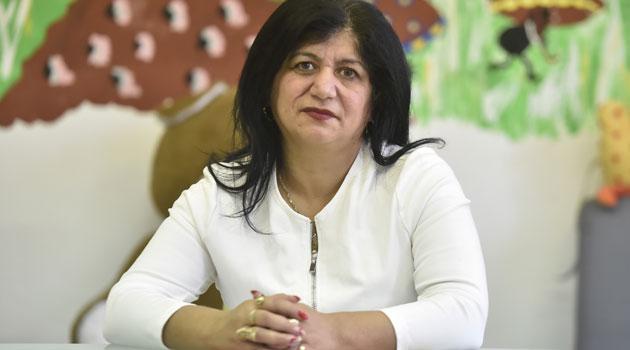Elena Gorolová: Some of the forced sterilization victims have died, but we are still fighting for compensation

Twenty-nine years ago, Elena Gorolová would never have guessed that one day she would be actively fighting for justice when it comes to the issue of Romani women who have been sterilized without their informed consent. How could it have – she was just 21 years old and had just heard the word “sterilization” for the first time, unfortunately along with the news that she herself had been sterilized during a Cesarean delivery.
It also would never have occurred to her that one day she might be the only Romani woman and the only woman from the Czech Republic to be included in the rankings of the 100 most influential and inspiring women in the world annually published by the British Broadcasting Corporation. Back in 1990 she was expecting her second child and focused on just one thing – that he or she would be born healthy.
She and her husband already had a son, and for that reason they were hoping for a daughter even more. Her entire second pregnancy went smoothly until the end of the third trimester, when she experienced complications.
She immediately went to the local hospital in the Vítkovice neighborhood of Ostrava, where the doctor told her she was not yet in labor. Once her labor began, she was moved to the maternity ward.
The obstetrician’s verdict was clear – a second Cesarean delivery was unavoidable and she was not able to deliver naturally. “After that everything went quickly, so it wasn’t strange to me at all that a nurse showed up before the operation with some papers and asked me to agree to the Cesarean. She also gave me a form for the child’s name,” Gorolová recalls of thet fateful day after which nothing would ever be the same.
Still in labor pains, she completed the papers and signed them without giving them any thought. She was taken to the operating theater, the amniotic sac was artificially ruptured by the surgeons, and after the delivery was complete she was transferred to the convalescence ward for five days.
There were no indications immediately afterward that anything had gone wrong. When she was able, she began to ask how the birth had gone and how the baby was.
Without blinking, the doctor informed her that she had been sterilized during the Cesarean delivery. “What does that mean? I almost began yelling because I had never heard that word before and to tell you the truth I was immediately afraid,” she recalls – and from the expression on her face one can tell she has not yet reconciled herself to the fact of her sterilization.
“The doctor explained that I had undergone two Cesarean deliveries at a very young age and that it would be very risky to undergo another. For that reason, according to the gynecologist, I had been sterilized,” she says sadly, adding that she had immediately asked what that meant for her future.
” ‘That means you will not be able to have any other children, sterilization is an irreversible procedure,’ he said, and my mouth fell open and I was unable to say a word. My world fell apart, I panicked, and the only thing I could do was cry. I was 21, and I was infertile after the doctor’s intervention. I could not comprehend it, sterilization was not at all necessary in my case, I could have had a third child eventually,” she says with a fading voice.
No reason not to trust them
When she began investigating why women were being sterilized, she was shocked by what she learned. The communist regime had basically instituted such measures to make sure the population of Romani people did not increase.
The Government had made a clear decision: Sterilizations should be performed on Romani women. “They succeeded with that,” says Gorolová vigorously, who in the interim has become a field social worker and is involved in fighting for the rights of women who were sterilized without their informed consent both before and after 1989.
“The last case of a woman being sterilized in this way that we know about is from 2007,” she warns. She also recounts how social workers were deployed to “correct” the population of Romani people in this way.
Financial benefits were offered to Romani women in exchange for their sterilization. The fact that sterilization is irreversible is something they forgot to mention.
Some of the women harmed in this way say today that doctors alleged to them that sterilization was just a form of temporary contraceptive. “One had no reason not to believe the doctors,” says Gorolová, who also recounts cases in which some Romani mothers were threatened with their existing children being taken into state care if they did not undergo sterilization.
Protecting their daughters and granddaughters
The most difficult aspect was when she had to break the news to her husband and the rest of her family. “I was afraid of what their reaction would be. My husband took it very hard. It bothered him just as much as it did me, but neither of us tried to stand up for ourselves at the time, we didn’t know where to go or how to fight against what had been done to me,” she says sincerely, recounting that a social worker at the Labor Office made it clear to her she was not interested in her case and would not be aiding her in dealing with the situation.
“After that I just resigned myself to it and stopped demanding my rights,” she recalls bitterly. The breakthrough did not come until several years later, when she saw a teletext message about women who had been sterilized without their informed consent getting together to share their stories.
“When I saw that, everything sort of clenched inside me. I was one of them, after all,” she says, adding that her decision to visit the organization where the women with such stories were coming together gave her a feeling of liberation.
She realized she was not alone. “At that time I decided to do all I could to make sure nothing similar happens to our daughters and granddaughters,” she said.
She gradually began to collaborate with the group, and later even became their spokesperson. The determination to fight led her to complete her secondary education at a teacher training college and to fully dedicate herself to social work.
A doggedness developed in her that her family could not fail to notice – it was not customary for the women she knew to behave in an emancipated way, or to have their own personal aims. She decided to take on the issue of forced sterilization once and for all, holding various seminars, helping to produce an exhibition of photographs by the victims, and beginning to communicate with other women through social media about the issue.
She is now in contact with almost 200 such women from the Czech Republic and is also in contact with women in Slovakia who have undergone sterilization without their informed consent. Most are of Romani origin, but non-Romani women have also appeared with similar stories, although not as many for the time being.
Today she works as a field social worker for the Life Together (Vzájemné soužití) organization where the victims first assembled all those years ago. She does her best to help children living in children’s homes return to their birth families, all the while remaining in contact with other forcibly sterilized women and fighting in her spare time for recognition that was done to her was wrong.
The fight is not over
“I wanted to build a stable, strong organization where the women who had been sterilized against their will would support each other and do their best to stop this from happening to other women,” Gorolová describes her initial intentions for the work she has done for 15 years now. She has been especially aided by Gwendolyn Albert, an American woman living in the Czech Republic who is a source of great support to her, including during trips abroad because, as Gorolová herself says, she does not speak any world languages and the issue of the forced sterilizations is, unfortunately, much more openly accepted abroad than it is in the Czech Republic, where few politicians have wanted to make clear statements about it.
The exception was the Government of Czech Prime Minister Jan Fischer, which expressed regret to the Romani women in 2009 for the illegal sterilizations they had undergone. Compensation for these violations, however, has not yet been awarded to most of them.
The fight to compensate the women who have been sterilized without their informed consent therefore continues. Gorolová’s endeavor has been, together with a team of volunteers, to convince as many MPs as possible to take an interest in the issue of unlawfully-performed sterilizations of Romani women and to award compensation to the women who have been harmed in this way.
Czech Prime Minister Andrej Babiš has also communicated to Gorolová that if the majority of MPs will be in favor of awarding such compensation, he will not have a problem with it. She is reserved about the possibilities.
“From the original proposals of a million crowns in compensation [EUR 40 000] the amount discussed was first cut in half, and now what is being discussed is roughly CZK 120 000 [EUR 5 000]. Considering what was done to us, that is a very low amount, it doesn’t correspond to the harm, it’s basically ridiculous. Some of these women have passed away in the interim, they did not live to hear the good news that compensation would be coming, but we are not giving up this battle, including for them. In the past human rights were denied, mostly to Romani women who were not allowed to make these decisions freely, and I think that is enough of a reason for us to keep on fighting,” she says.
First published in Romano voďi magazine
